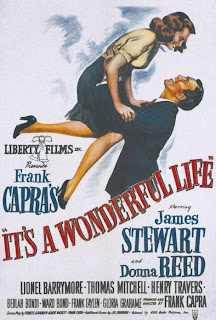
It honestly doesn't take much to begin to imagine It's a Wonderful Life in science fiction terms. The angels, for example, taken out of their spiritual context, become an advanced extraterrestrial race. In fact, even within their spiritual context, they are still a race of enormously powerful beings from outside the Earth—literally, an advanced extraterrestrial race. They use their powers to take human form and to transport George Bailey to an alternate universe in which he had never been born; both of these plot devices are firmly established within the science fiction realm. With these things in mind, why ISN'T It's a Wonderful Life science fiction?
Mainly, it isn't science fiction because the movie would not be served well by such a description. It's a Chistmas movie. It's a family movie. It's an inspirational movie. And certainly, anyone looking for these sorts of movies would do well to search it out and watch it. People who are looking for science fiction movies, though? They'd be disappointed. Whether or not It's a Wonderful Life is science fiction, it certainly isn't framed that way.
But to me, it doesn't matter whether the film has Christmas and angels or shape-shifting aliens and alternate universes; what matters to me is whether it uses those plot devices to explore questions relating to reality or humanity or any of the basic, unanswered questions that define what it means to be alive and human and self-aware. And It's a Wonderful Life does. It asks, "How do our actions affect the future? What impact do I have on the universe? Can I define reality for myself, or do I have a destiny?" It's the way it asks these questions that make it such a heart-warming movie. Watching George Bailey struggle to find meaning in his life forces the movie's audience to do the same. As you watch It's a Wonderful Life you cannot help but think, "Am I important? Do the things I do matter?" And that effect would not—could not have been possible without George traveling to an alternate universe.
And alternate universes are definitely a staple of science fiction, as are the questions they inspire. The questions brought up by It's a Wonderful Life have been brought up many other times, always by science fiction, and mostly in time travel stories, from Back to the Future to "The Minority Report." But in my opinion, the most useful and apt comparison comes from the most re-published science fiction short story in history: Ray Bradbury's "A Sound of Thunder."

In "A Sound of Thunder," a fellow named Eckels travels back in time to hunt dinosaurs. In order to keep hunters from messing with the past in any dangerous ways, the time travelers have constructed floating paths and they only kill dinosaurs that were about to die of natural consequences anyway. Unfortunately, Eckels is scared when a tyrannosaurus comes bursting out of the underbrush—so scared that he runs off the path and accidentally steps on a butterfly. When he returns to the future, he finds that, because of this small slip, many things have changed, from the spelling of words to the outcome of the recent election (hence the inspiration for the term coined by chaos theorist Edward Lorenz: the butterfly effect).
To me, it seems only logical that It's a Wonderful Life is an exploration of the implications of "the butterfly effect" before the effect had a name and before "A Sound of Thunder" had even been written. It's not hard to imagine a strange sort of Sound of Thunder/Wonderful Life hybrid in which George Bailey, despairing, travels back in time to edit himself out of existence; upon returning to the future, he realizes that the world has fallen into disarray as a result of his choice. He reverses his decision, and emerges back into the original future with a renewed appreciation for the effect he had on the world. Such a hybrid would carry with it most of the themes of both stories, and ask all the same questions.
This entire train of thought then begs the question, "Why do I bother calling this genre 'science fiction' at all?" Clearly, if It's a Wonderful Life is science fiction, but Star Wars isn't, I've departed from the classical definition of science fiction in all sorts of ways. So maybe "science fiction" isn't the right term, maybe my purpose would be better served by the invention of some new genre. But the fact is, science fiction plot devices like aliens and time travel and dystopia and post-apocalypse are the only plot devices capable of exploring the questions I'm talking about. They often come in different forms—some almost unrecognizable as science fiction—but the intent is there. It is science fiction's philosophical backbone that has made it the genre it is today. I don't think it's too much of a stretch for me to want to honor the stories that honor that legacy—stories like It's a Wonderful Life.
1 comment:
The problem with your construct is the presence of the word "science" in the name of your preferred genre. Someone should go back in time and rename it so that you don't have to explain that "It's A Wonderful Life" has anything to do with science.
Post a Comment